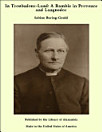關於本電子書
The gentry or nobility—the terms are the same on the Continent—went to live in the towns. They could no longer afford to inhabit their country mansions. They acquired a taste for town life, its conveniences, its distractions, its amusements; they ceased to feel interest in country pursuits; they only visited their mansions for about eight weeks in the year, for the Sommer-frische. Those who could not afford to furnish two houses, carted that amount of furniture which was absolutely necessary to their country houses for the holiday, and that concluded, carted it back to town again. This state of things continues. Whilst the family is in residence at the Schloss it lives economically; it is there for a little holiday; it does not concern itself with the peasants, the sick, the suffering, the necessitous. It is there—pour s'amuser. The consequence is that the Schloss is without a civilizing influence, without moral force in the place. The country folk have little interest in the family, and the family concerns itself less with the people.
Not only so, but it brings little money into the place. It employs no labour. It is there not to keep open house, but to shut up the purse. In former days the landlord exacted his rents, but then he lived in the midst of his tenants, and the money that came in as rent went out as wage, and in payment for butter, eggs, meat, oats, and hay. The money collected out of a place returned to it again. It is so in many country places in England now where squire and parson live on the land.
In Germany the peasant has stepped out of obligation to the landlord into bondage to the Jew, who receives, but spends nothing. In France the condition is much the same; the great house is a ruin, and so, very generally, is the family that occupies and owns it, if it still lingers on in it.







